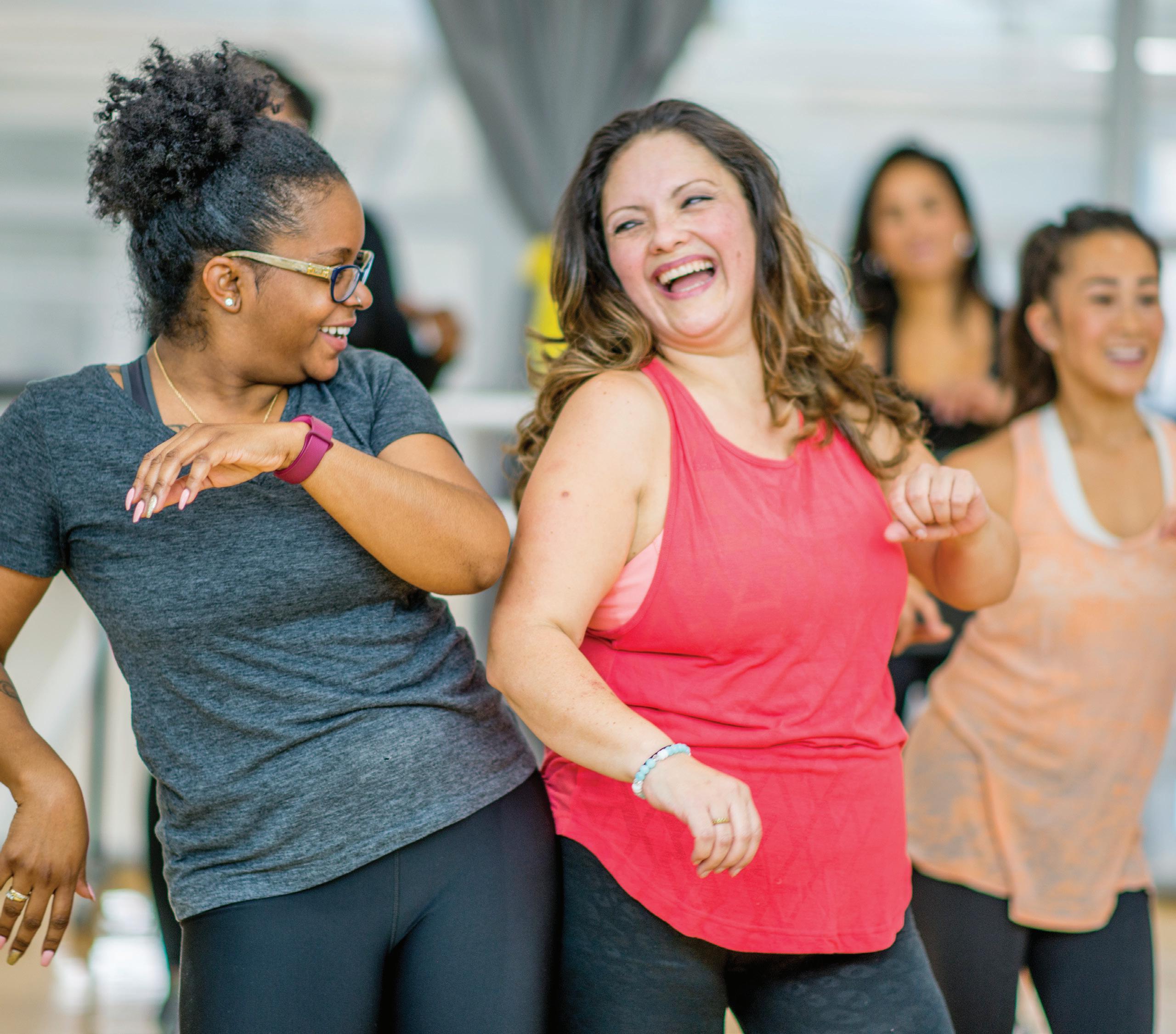






March is Lymphedema Awareness Month. An estimated 1 million Canadians are affected by lymphedema, including 238,00 Quebecers. Of this group, 75,000 are trying to live with lymphedema caused by cancer treatments, while access to decongestive therapies is still very limited, if not threatened. What can we do?
We need to join forces with patients, healthcare professionals and industry partners!
The primary mission of the LAQ is to raise awareness of this chronic and disabling disease. This year, we can count on the unwavering support of JOBST by Essity, our Diamond Partner. Thanks to the dedicated support of this leading manufacturer of compression garments, the LAQ is particularly active in raising public awareness during the month of March:
• 1 social media release per day to educate, raise awareness and provide tools
• 1 patient webinar on March 21
• 1 webinar for professionals on March 26th
• The Let’s Talk Lymphedema campaign to reach your healthcare professionals
We salute and thank Essity for their exemplary commitment to the lymphedema cause as a Diamond Partner. Essity,
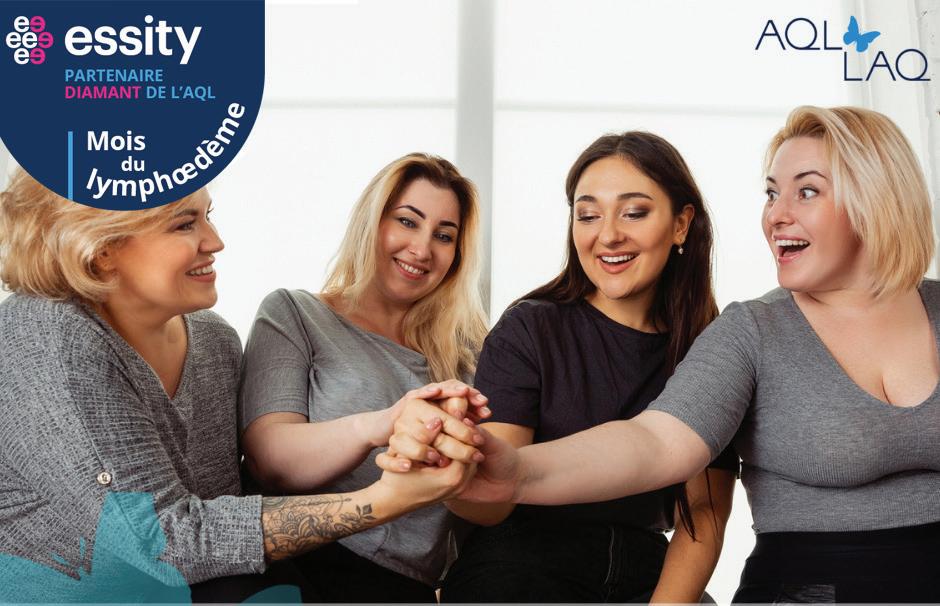
manufacturer of JOBST compression garments, is a leader in wound care and related vascular disorders and a major player in non-invasive orthopedics - combining its broad portfolio with strong technological capabilities. Essity is committed to providing relevant, integrated therapy solutions that make a difference in patients’ lives.
On behalf of everyone living with lymphedema, thank you!
See pages 4, 5 and 6 for the LAQ’s advocacy activities:
• Photo Blitz to put lymphedema on the media map
• Petition to save MUHC Lymphedema Clinic from budget cuts and service interruptions
• An email you send to Mr. Christian Dubé, Minister of Health and Social Affairs

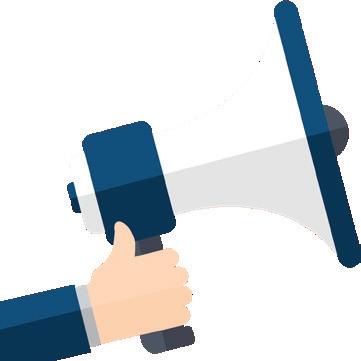
It’s easy to educate your healthcare professional with our Let’s Talk Lymphedema kits.
Order free LAQ Healthcare Professional Kits and distribute them to your clinic, doctor, nurse, physical therapist, rehabilitation therapist, etc. In short, any caregiver who could benefit from lymphedema resources. Lymphedema and its treatments are still poorly understood in the healthcare community. Help us change that.

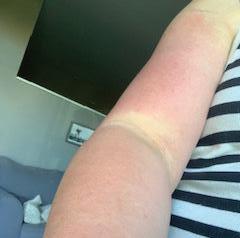
To receive free «Let’s Talk Lymphedema» kits, write to aql@infolympho.ca with your name, mailing address, and the number of kits you would like.
Please allow 5 business days for delivery.
Let’s Talk Lymphedema together and raise awareness of this chronic, debilitating disease! Thank you for helping us kick off this important campaign!
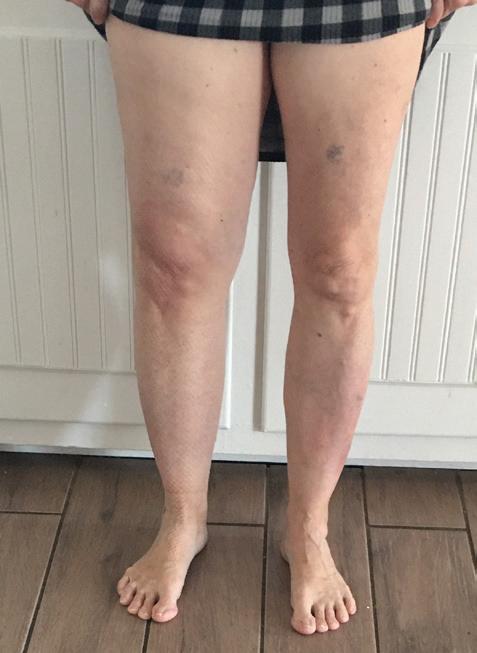
It’s extremely difficult to find and legally distribute royalty-free photos of people with lymphedema. Journalists would really like to help the cause by allowing their audience to see what you are going through. After all, you often have to see it to believe it!
To help solve this problem, the LAQ is launching a Photo Blitz. Please share with us your cell phone pictures:
• Before your decongestive treatments beganwith or without compression
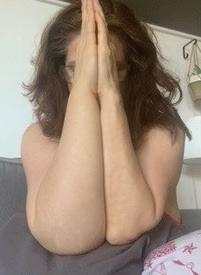
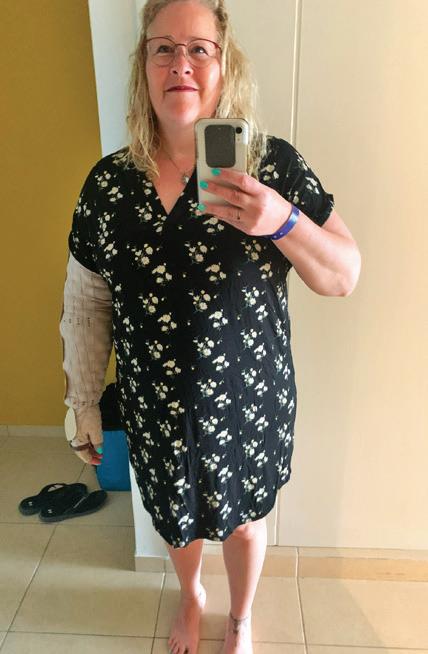
• After decongestion - with or without compression
• While fighting cellulite
• Any photo of a lymphedema challenge you face
• The photo may or may not include your facelet us know if you want us to blur your face
• The more neutral and uncluttered the background, the more useful your photo will be.
Please submit your photos to aql@infolympho.ca
Copy, paste and complete the text below in your message:
Donating my photos to the LAQ. By donating my photos to the LAQ on this DATE MONTH YEAR, I, FIRST NAME, LAST NAME, grant the LAQ a right of general use, including but not limited to use in traditional media, websites, social media, which may be used for awareness, promotional or training purposes, and I waive all present and future recourse and compensation related to the use of these photos. I may revoke my consent
at any time by sending written notice to aql@infolympho.ca, clearly identifying the photos submitted.
We archive your photos on a hard drive and identify them with the date and time of your email. Your name will never be associated with them, ensuring the promised anonymity. Thank you all for making lymphedema more visible.
Together, it’s less of a burden
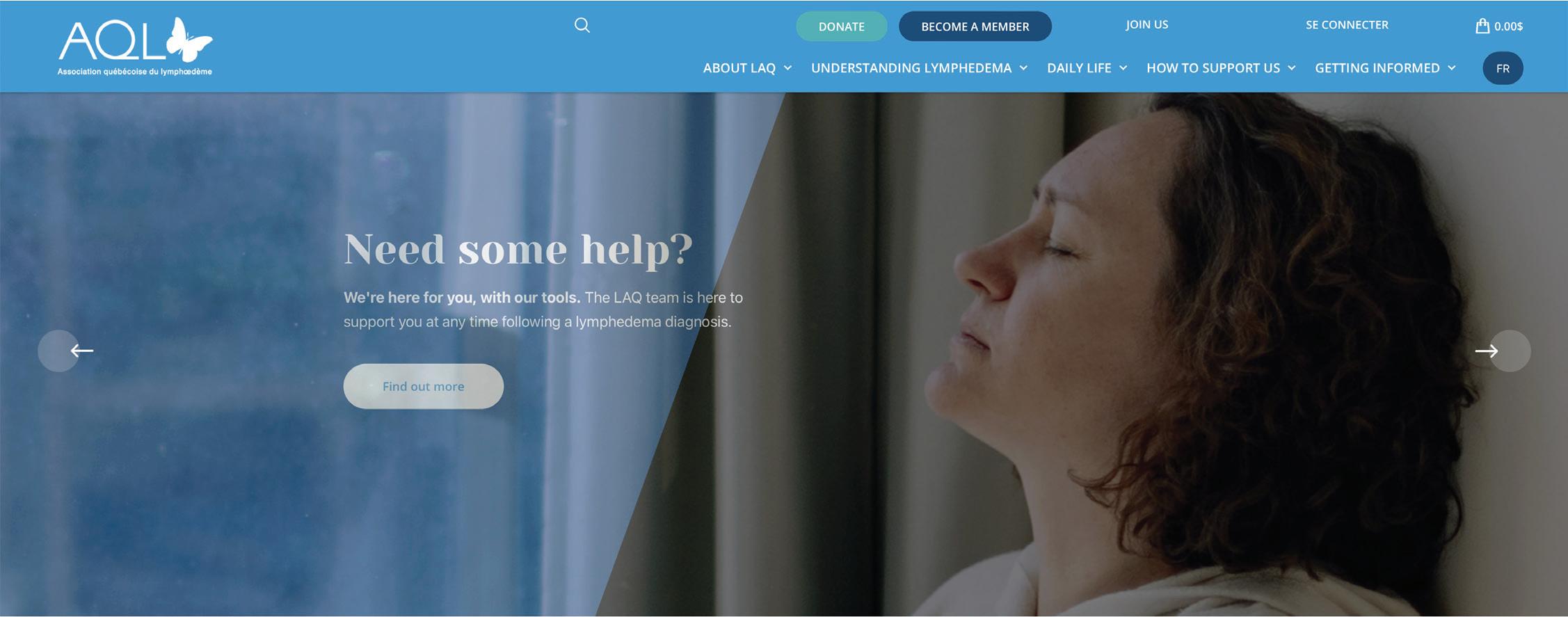
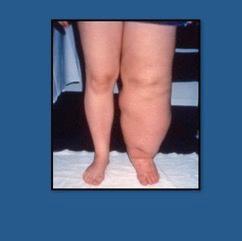
We have a big problem.
Thanks to you and a total still going of 3,600 signatures, we were able to reverse the decision to permanently close the MUHC Lymphedema Clinic. Interviews given by the LAQ and patients to the Journal de Montréal and CTV reinforced the reversal of this drastic decision. BUT…
What remains unsaid is that the funding would be greatly reduced and for a limited period of time. This will affect patients’ access to the clinic’s services and could eventually result in an interruption of services. The decision seems unassailable. It’s all happening behind closed doors. What’s more, there is talk about replacing the cutting-edge expertise of trained and experienced therapists with nurses untrained in lymphedema care! Lymphedema treatment requires specific training in decongestive lymphatic therapy (Casley-Smith, Klose, Vodder School, etc.). The intended savings will come at the expense of patients.
Not a single penny from the MSSS is devoted to lymphedema management.
Join the LAQ in saying: Enough is enough! We deserve fair access to quality treatment. What you can do:
1. Sign the petition at https://bit.ly/Sauvez-la-Clinique-Save-the-Clinic
2. Share the petition with your network
3. Write to the Minister of Health and Social Services: ministre@msss.gouv.qc.ca
Suggested email to send to Mr. Christian Dubé, Minister of Health and Social Affairs:
Subject: Equitable Access to Quality Lymphedema Care
Dear Mr. Dubé,
Given that the budgets of Quebec’s hospitals and integrated cancer centers are not clearly and fully covered by the MSSS for the funding of lymphedema treatments, I ask you to rectify the situation immediately by allocating the resources needed to treat lymphedema patients equitably.
I add my voice to that of the Lymphedema Association of Québec, which represents the thousands of Quebecers affected by lymphedema.
Lymphedema must be treated by therapists certified in decongestive lymphatic therapy. This therapy aims to reduce the volume of swelling and teach self-management skills before the patient can safely wear a compression garment. This treatment is not currently covered by RAMQ.
The threat of closure of the MUHC Lymphedema Clinic in February 2024, followed by the recent decision to reduce funding for this clinic, makes me realize that without adequate funding from the Ministry of Health and Social Services, the already very limited access to lymphedema care will remain far too fragile and inequitable.
I’m a real citizen with a real condition. But because it’s lymphedema, the health care system treats me like a second-class citizen. This is unfair and needs to change.
Please act quickly to correct this injustice.
YOUR NAME
YOUR FULL MAILING ADDRESS
Your next online education and support group takes place on March 21, 2024, at 7 p.m.
DIn this presentation, JUDITH LAVOIE, Lymphedema Clinical Resource for compression manufacturer Essity, will provide you with a wealth of information on day and night products for both the decongestion and maintenance phases. Judith Lavoie has been fitting compression garments for many years and is also a Vodder lymphatic drainage therapist.
Learn more about lymphedema and discover JOBST by Essity compression garment showcase! ZOOM presentation in French. Bilingual Q&A. This free event, organized by the LAQ, will take place on Thursday, March 22 at 7 p.m. Free and MANDATORY registration by clicking here.
We look forward to seeing you!
This lymphedema event is made possible by Essity and the Lymphedema Association of Québec, whose mission is to support those at risk and those affected, while raising awareness of lymphedema as a chronic disease within the healthcare community.

BROUGHT TO YOU FROM ESSITY
Lymphedema Month
Online presentation on March 26, 2024 at NOON.
Lymphedema and Compression Training with JUDITH LAVOIE, Lymphedema Clinical Resource for compression manufacturer Essity. – A presentation reserved for healthcare professionals involved in the treatment of lymphedema. Certified therapists, orthotist-fitters, nurses, physicians, physical therapists, occupational therapists, kinesiologists and massage therapists are welcome! Free, MANDATORY registration.
Register
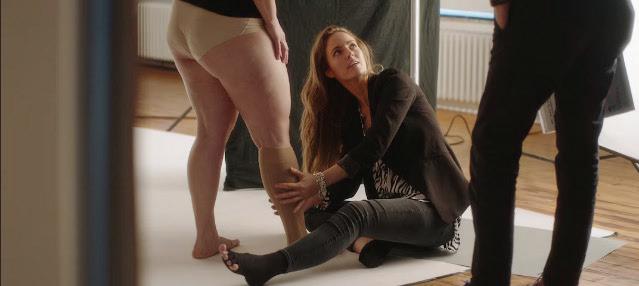
to go to be cared for and helped if you have lymphedema
Living with lymphedema can be a physical, emotional, and financial burden. The LAQ has compiled a list of resources that can help.
Our Therapeutic Support Program
Call us at 1 866 979-2463 / 514 979-2463 or write to us at aql@infolympho.ca
Toll-free service available 24/7, 365 days a year. Therapists on call weekly
Our website NOW AVAILABLE IN ENGLISH to educate yourself and review your basics
Notre Bottin du lymphœdème en ligne ou par la Carte interactive pour trouver des thérapeutes, des orthésistes/ajusteurs, des ressources et des conseils
Our Lymphedema Guide online or via the interactive map to find therapists, orthotists/ fitters, resources and advice.
Our Support groups to learn, ask questions and share ideas
Our Video library to visualize lymphedema and its treatments
2 Hospital centres with lymphedema programs
McGill University Health Centre
Lymphedema Support Centre of the Quebec Breast Cancer Foundation
5252, boul. de Maisonneuve Ouest, bureau 105b, Montréal, QC H4A 3S5
Phone: 514 934-1934, ext.: 78716
Fax: 514 489-2718
Centre des maladies du sein de l’Hôpital du Saint-Sacrement du CHU de QuébecUniversité Laval
Restricted to HSS breast cancer patients. 1050, chemin Ste-Foy, Québec, QC G1S 4L8
Phone: 418 682-7878
Pediatric Lymphedema Clinic at the CHU Sainte-Justine University of Montréal
For children ages 0 to 18
Université de Montréal
Phone: 514 345-4931, ext.: 3368
3175, chemin de la Côte-Sainte-Catherine, étage B5, Montréal, QC H3T 1C5
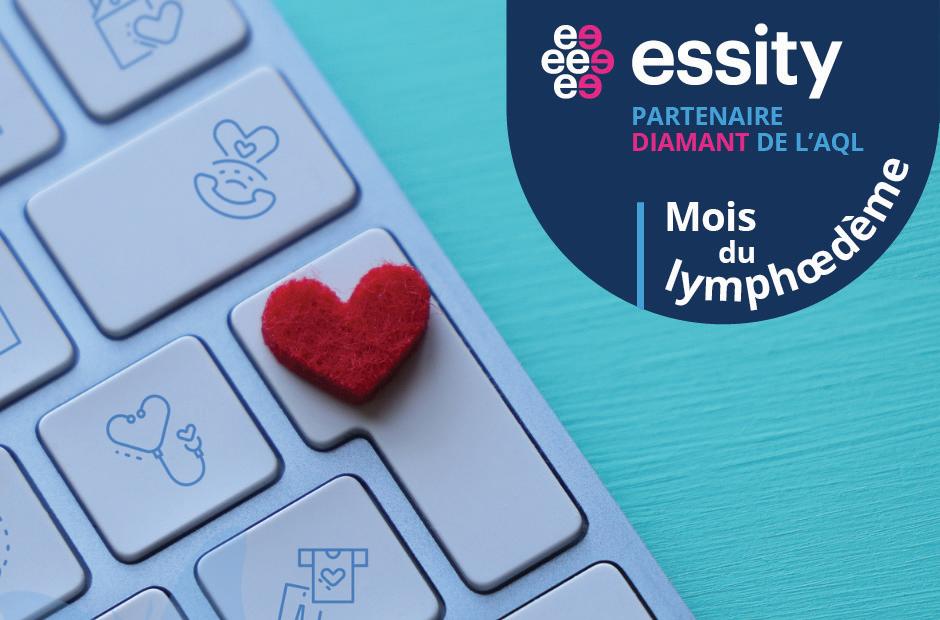
JGH Lymphedema Clinic/Segal Cancer Center Jewish General Hospital
Restricted to JGH patients.
3755, chemin de la Côte-Sainte-Catherine, Pavillon E – Bureau 861, Montréal, QC H3T 1E2
Phone: 514 340-8222, ext.: 24287
Fax: 514 340-8615
Breast Clinic of the MUHC Lymphedema
Restricted to patients of the Breast Clinic of the MUHC, Royal Victoria Hospital.
1001, boul. Décarie, Pav. C North, 6th floor, Montréal, QC H4A 3J1
Phone: 514 934-1934, ext.: 32829
Fax: 514 843-1692
Lymphedema Clinic of Cité-de-la-Santé
Restricted to patients of the Cité-de-la-Santé.
1755, boul. René-Laennec, Centre intégré de cancérologie, Bloc B, RC 124, Laval, QC H7M 3L9
Phone: 450 975-5401
Fax: 450 975-5055
Service de physiothérapie du CHUM
Restricted to patients of CHUM.
Pavillon C-5e étage. 1051, rue Sanguinet, Montréal, QC H2X 0C1
Phone: 514 890-8301 – Fax: 514 412-7268
Service de physiothérapie de l’Hôpital de Saint-Jérôme
Restricted to patients of HSJ, who meet the selection criteria of the Physical Therapy Department and who have recently undergone breast surgery involving the axilla due to breast cancer.
290, rue de Montigny, 3eA physiothérapie, Local A-3155, Saint-Jérôme, QC J7Z 5T3
Phone: 450 432-2777 ext.: 22538
Fax: 450 431-8314
CRIC Centre régional intégré en cancérologie Centre intégré de santé et de services sociaux de Chaudière-Appalaches
Restricted to cancer-related lymphedema 101, rue du Mont-Marie, Lévis, QC G6V 5C2 Phone: 418 830-7474, ext.: 14712
Essity, our partner Diamant - manufacturer of JOBST compression garments - has kindly sponsored this article.
Département de physiothérapie Centre intégré de cancérologie de la Montérégie, Hôpital Charles-LeMoyne
Restricted to patients who have undergone breast cancer surgery at HCLM.
3120 boul. Taschereau, Greenfield Park, QC J4V 2G9
Phone: 450 466-5000 ext.: 2630
3 Authorized public facilities to treat lymphedema
BAS-SAINT-LAURENT
Centre intégré de santé et de services sociaux du Bas-Saint-Laurent
(Centre de santé et de services sociaux de la Mitis)
800, avenue du Sanatorium Mont-Joli, QC G5H 3L6
Phone: 418 775-7261
SAGUENAY – LAC-SAINT-JEAN
Centre de santé et de services sociaux de Jonquière
2230, rue de l’Hôpital Jonquière, QC G7X 7X2
Phone: 418 695-7788
CAPITALE-NATIONALE
Centre intégré universitaire de santé et de services sociaux de la Capitale-Nationale – IRPDQ
525, boulevard Wilfrid-Hamel, bureau D-06 Québec, QC G1M 2S8
Phone: 418 529-9141
4 RAMQ Compression Garment Program
RAMQ assistance is set at 75% of the cost of compression garments and bandages, up to the maximum amount covered, before taxes and delivery charges. For persons under 18 years of age and for persons receiving financial assistance with a claim booklet or the Objectif Emploi program, assistance is set at 100% of the cost of compression garments and bandages, up to the maximum amount covered, before taxes and delivery charges.
5 Community Financial Assistance
If you are experiencing financial hardship, one of these organizations may be able to help you access lymphedema care, depending on where you live.
Cancer-Assistance du Québec
Région : Tout le Québec
Phone: 1 866 640-0900
Centre d’action bénévole du Bas-Richelieu – relié au cancer/cancer-related Région : Sorel-Tracy
Phone: 450 743-4310
www.cab-basrichelieu.org/fr/default.aspx
Fondation du cancer du sein du Québec
Région : Tout le Québec
Phone: 514 871-1717
Free: 1 877 990-7171
www.rubanrose.org - https://bit.ly/3qE7BFc
Les roses pour la cause
Région : Lac-Mégantic
Phone: 819 214-ROSE (7673)
https://www.lesrosespourlacause.com
Maison MAIN...TENIR l’espoir
Région : Trois-Rivières, Mauricie/ Centre-du-Québec
Phone: 819 909-7443
www.maisonmaintenirlespoir.com
Maison Victor-Gadbois – cancer stade 4, fonctionnel/stage 4 cancer, functional Région : Montérégie
Phone: 450 467-1710
https://maisonvictor-gadbois.com/centre-dejour
Mission Tournesol – Centre Inspire la vie
Région : Abitibi-Témiscamingue
Phone: 819 290-4572
www.missiontournesol.com
Embarking on a regular walking routine is a commendable decision for your overall wellbeing and your lymphedema. While the fundamental act involves putting one foot in front of the other, there are nuances to consider for a safe and beneficial walking program.
Walking is a universally accessible exercise, making it an excellent choice for individuals at various fitness levels. Whether you are already physically active or just beginning your fitness journey, starting a walking program involves understanding the right pace, essential safety measures, and creating a personalized training plan.
SeloEvery step contributes to your physical activity, according to experts in physical activity and kinesiology. While all walking is beneficial, increasing your pace and duration enhances the fitness benefits. Aim for moderate intensity or low-intensity steady-state exercise, where your heart rate and breathing are slightly elevated. A good guideline is that you should be able to talk but not sing.
Projet Safir – cancer du sein seulement/ breast cancer only
Région : Tout le Québec
Phone: 514 461-2088
Fax: 1 450 748-0598
www.fjmp.org/fr/safir
Se reconstruire - Centre de santé du sein
Région : Tout le Québec
Phone: 438 527-SEIN (7346)
www.centresereconstruire.ca
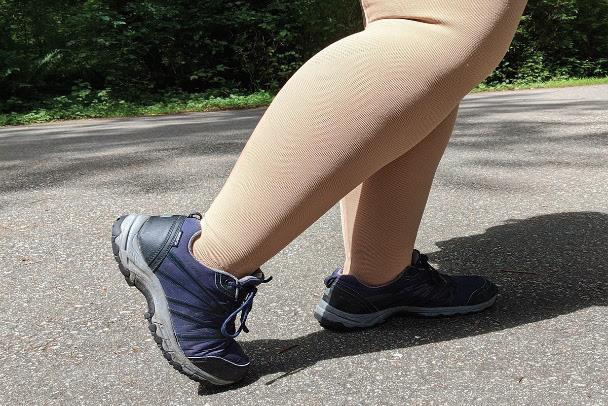
Selecting the appropriate pace, choosing suitable footwear, and determining the duration can maximize the benefits of your walking workout.
Walking workouts don’t require fancy clothing, but the right shoes are crucial. Opt for lowheeled running shoes for optimal support, favoring racing flats over thicker-soled trainers. If you have knee or back issues, consider additional cushioning. Visiting a local running store can help assess your gait and recommend suitable shoes. Clothing should prioritize comfort, breathability, and layering options, with cotton fabrics being a preferred choice.
Ensuring safety during walks is paramount. Before every walk, perform five safety checks:
1. Leave Earbuds Behind: Avoid distractions by leaving earbuds at home. Awareness of surroundings is crucial for outdoor walks.
2. Walk Facing Traffic: Unlike cars, walk facing traffic to be visible to oncoming vehicles.
3. Carry ID: Keep identification, such as a driver’s license, in a running belt or secure pocket.
4. Communicate Your Habits: Inform someone about your walking route, and share your routes with friends and family. Avoid unpopulated or poorly lit areas.
5. Enhance Visibility: Wear reflective clothing or shoes if walking before dawn or after dusk. Bright colors increase visibility to drivers, bikers, and others. (1)
The most suitable warm-up for walking is walking itself. Start your workout with an easier-paced walk and gradually increase the pace. For those planning faster-paced walks, incorporate dynamic flexibility drills like leg swings, hip circles, and walking toe touches. These drills gently introduce movement to the muscles and joints you’ll engage during the workout.
Starting a walking program involves determining your baseline. If you have a step counter, wear it for a few days to establish your average daily steps. Increase this by 1,000 steps per day, gradually progressing to 7,000 to 10,000 steps daily, as research correlates these levels with a lower risk of mortality. Alternatively, focus on duration, adding 10-minute walks most days, with incremental increases. Aim for 150 to 300 minutes of walking per week. (2)
Plan at least one day of rest or active recovery per week, listening to your body’s signals. If a full rest day is needed, engage in activities like meditation, reading, or cooking. Active recovery involves lighter versions of the activity or complementary exercises, such as a slow walk, gentle yoga, or light swimming.
Picking the right pace, wearing suitable shoes, and adhering to an appropriate duration can significantly enhance the benefits derived from a walking workout. By following a structured plan and incorporating safety measures, walking becomes a versatile and accessible exercise, contributing to a healthier lifestyle. Enjoy!
References:
1. Runner Safety Tips. Road Runners Club of America.
2. Paluch AE et al. Steps per Day and All-Cause Mortality in Middle-Aged Adults in the Coronary Artery Risk Development in Young Adults Study. JAMA Network Open. September 1, 2021.
WEEK 1
Day 1 Walk 10 minutes
Day 2 Walk 10 minutes
Day 3 Walk 10 minutes
Day 4 Walk 10 minutes
Day 5 Walk 10 minutes
Day 6 Rest or cross-train
Day 7 Walk 10 minutes
WEEK 2
Day 1 Walk 15 minutes
Day 2 Walk 15 minutes
Day 3 Walk 15 minutes
Day 4 Walk 15 minutes
Day 5 Walk 15 minutes
Day 6 Rest or cross-train
Day 7 Walk 15 minutes
WEEK 3
Day 1 Walk 20 minutes
Day 2 Walk 20 minutes
Day 3 Walk 20 minutes
Day 4 Walk 20 minutes
Day 5 Walk 20 minutes
Day 6 Rest or cross-train
Day 7 Walk 20 minutes
WEEK 4
Day 1 Walk 25 minutes
Day 2 Walk 25 minutes
Day 3 Walk 25 minutes
Day 4 Walk 25 minutes
Day 5 Walk 25 minutes
Day 6 Rest or cross-train
Day 7 Walk 25 minutes
*The rest or cross-training day can be moved to any day that works best with your schedule
The Lymphedema Association of Québec is a patient association dedicated to the advocacy of people with lymphedema or at risk of developing lymphedema.
We are proud to have 208 ordinary and professional members, 30 corporate members and 63 service points.
In January and February 2024, the following new members joined us.
Marie-Louise Blais - Claudia Maranta - Lola McNamara
Rosemary Okuda - Denise Poulin - Mireille Roy
We welcome you and thank you for your support!
You have until March 31, 2024 to join at the annual rate of $35. Your LAQ membership entitles you to exclusive benefits!
• Monthly newsletter L’info AQL
• Printed quarterly Pathways magazine
• Self-management booklet Learning to take charge
• Cellulitis Assistance Card
• Self-measurement guidelines for arms and legs
• L’info AQL Surgery edition
• VIP invitations for support education and groups. plus events
• Your tools are mailed to you AND accessible in your online Member Section
Effective April 1, annual membership dues for regular members will increase to $42.
Your association participated in the Congrès du Programme québécois de cancérologie (PQC) held on November 16, 2023 and January 25, 2024.
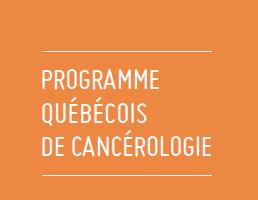
Presentations of interest on the congress program related to lymphedema included Orientations prioritaires en cancérologie 2023-2030, Teaming up with community organizations in oncology, Utilization of outcomes reported by geriatric patients in oncology, Discutons Santé Tool and evaluation of its effects in prostate cancer patients and End-of-Life Care and awareness of different oncology settings.
Working within the Ministère de la Santé et des Services Sociaux (MSSS), the PQC’s mandate is to direct, coordinate and evaluate government actions aimed at reducing the burden of cancer in Quebec. This department is supported in its activities by the Réseau de cancérologie du Québec (RCQ) and a number of partners, such as community organizations.
Every year, the LAQ makes it a point to attend the PQC Congress to gain a better understanding of the priorities and issues that affect many of the patients we represent.
Not sure how to measure your limb?
Drop by the Store of Hope to get a measuring tape, complete with photos and measuring instructions from lymphedema therapists.
A compression garment must be washed daily in order to keep it supple and effective. Dry it on a clothes line or a rack at a slight angle. It is good
